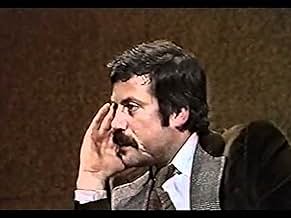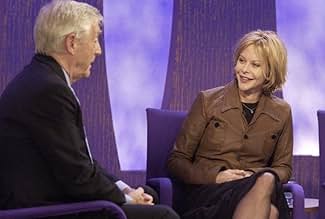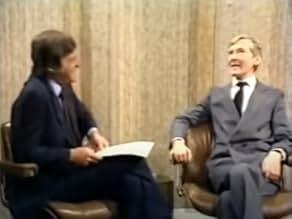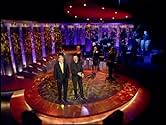Ajouter une intrigue dans votre langueJournalist Michael Parkinson interviews a broad range of the most famous people in the world.Journalist Michael Parkinson interviews a broad range of the most famous people in the world.Journalist Michael Parkinson interviews a broad range of the most famous people in the world.
- Victoire aux 1 BAFTA Award
- 4 victoires et 8 nominations au total
Parcourir les épisodes
Avis à la une
The 1970s was the golden age of British television for so many reasons, not least because it was a time when television executives still assumed their viewers were intelligent enough to watch somebody sitting in a chair and speaking at length, without the need for regular interruptions and jokes from the interviewer. Michael Parkinson, unlike today's chat show hosts, was not a comedian, he was a journalist, and his talent was simply for researching his subjects and showing an interest in what they had to say. The remarkable thing about Parkinson was the variety of the guests. His abilities as an interviewer meant that he was able to successfully deal with guests as different as raconteurs (Kenneth Williams, Peter Ustinov), poets (John Betjeman), authors (Leslie Thomas), musicians (Duke Ellington) and scientists (Jacob Bronowski). Parkinson never dominated the show, he was quite happy to let the guests do that. As a result, he gave British television its greatest chat show, a standard that most subsequent chat shows didn't even bother to attempt.
In the 1970s the big stars rarely gave interviews, there were three television channels and no videos, DVDs or Internet. Parkinson had provided a rare opportunity to see these people. Clearly, things could not be the same when, in 1998, the BBC decided to resurrect the series, 16 years since it had ended. A great deal had changed in television over that period. As the 1990s progressed, the talk show increasingly became the domain of comedians as hosts: Jonathan Ross, Clive Anderson, Frank Skinner and Graham Norton. As such, chat shows became more lightweight and more about the host than the guest. Also, with the explosion of the media in the 1980s and 1990s, another effect was the decline in the meaning of celebrity. The revival of Parkinson lasted for nearly ten years but, unfortunately, the show was dying a slow death, with the man all too often having to interview celebrities so minor that you couldn't have made them up in the 1970s: Trinny & Susannah, Simon Cowell, Sharon Osbourne and Gordon Ramsay for examples. As hard as he tried, Parkinson could never convince me that he was as interested in these people as the great stars of the original series. I certainly wasn't.
In fairness, when he had a good guest he was still better than anyone else. One of his greatest abilities was to interview celebrities who are instinctively private and dislike the spotlight on themselves as subjects. He was better than anyone else at making these stars feel comfortable and able to talk, with Rowan Atkinson and Bobby Charlton being prime examples. I actually think that from what I have seen, only his contemporaries David Frost and Melvyn Bragg rival Parkinson in this regard.
Parkinson has now wrapped up his chat show. He has said himself that his show was the last survivor of the talk shows based on conversation. Now, all we have are the comedy shows based on the American format. In some ways it's a shame, in other ways it isn't. Most of the really fascinating stars are now dead or very, very old. Very few modern stars captivate the attention for very long, as Parkinson found in the last few years. Because even Parkinson couldn't make people interesting if they simply weren't.
In the 1970s the big stars rarely gave interviews, there were three television channels and no videos, DVDs or Internet. Parkinson had provided a rare opportunity to see these people. Clearly, things could not be the same when, in 1998, the BBC decided to resurrect the series, 16 years since it had ended. A great deal had changed in television over that period. As the 1990s progressed, the talk show increasingly became the domain of comedians as hosts: Jonathan Ross, Clive Anderson, Frank Skinner and Graham Norton. As such, chat shows became more lightweight and more about the host than the guest. Also, with the explosion of the media in the 1980s and 1990s, another effect was the decline in the meaning of celebrity. The revival of Parkinson lasted for nearly ten years but, unfortunately, the show was dying a slow death, with the man all too often having to interview celebrities so minor that you couldn't have made them up in the 1970s: Trinny & Susannah, Simon Cowell, Sharon Osbourne and Gordon Ramsay for examples. As hard as he tried, Parkinson could never convince me that he was as interested in these people as the great stars of the original series. I certainly wasn't.
In fairness, when he had a good guest he was still better than anyone else. One of his greatest abilities was to interview celebrities who are instinctively private and dislike the spotlight on themselves as subjects. He was better than anyone else at making these stars feel comfortable and able to talk, with Rowan Atkinson and Bobby Charlton being prime examples. I actually think that from what I have seen, only his contemporaries David Frost and Melvyn Bragg rival Parkinson in this regard.
Parkinson has now wrapped up his chat show. He has said himself that his show was the last survivor of the talk shows based on conversation. Now, all we have are the comedy shows based on the American format. In some ways it's a shame, in other ways it isn't. Most of the really fascinating stars are now dead or very, very old. Very few modern stars captivate the attention for very long, as Parkinson found in the last few years. Because even Parkinson couldn't make people interesting if they simply weren't.
I saw this show on BBC America and I must say it is a fun show to watch. The host isn't particularly funny, but the guest just go off into humorous tangents with their own little anecdotes You don't have to be British to enjoy it so I suggest you catch.
Michael Parkinson recently moved his chat show from BBC1 to ITV as BBC1 had offered him an earlier evening slot which he refused and ITV had no problem screening it at similar times as on BBC1. It is now usually shown at around 10 to 11:15 pm on Saturdays.
He has interviewed many stars over the years including some of the biggest names in Hollywood. Some of these stars include Michael Caine, Jimmy Tarbuck, John Wayne, Bruce Forsyth, Cilla Black, Julie Walters, Bruce Willis, Anne Widdecombe, Will Smith, Samual L Jackson and Kenneth Williams. One actor I'm surprised he has not interviewed yet is Leonardo DiCaprio, but there is time yet.
I quite enjoy watching Parkinson on Saturdays, even though sometimes he has guests on that I have never heard of. Certainly better than Johnathan Ross's Friday chat show.
Long may Parky be chat show king.
He has interviewed many stars over the years including some of the biggest names in Hollywood. Some of these stars include Michael Caine, Jimmy Tarbuck, John Wayne, Bruce Forsyth, Cilla Black, Julie Walters, Bruce Willis, Anne Widdecombe, Will Smith, Samual L Jackson and Kenneth Williams. One actor I'm surprised he has not interviewed yet is Leonardo DiCaprio, but there is time yet.
I quite enjoy watching Parkinson on Saturdays, even though sometimes he has guests on that I have never heard of. Certainly better than Johnathan Ross's Friday chat show.
Long may Parky be chat show king.
Watched him since the 70's, always polite , draws guests out like no other, the only one Oprah would go on!he is the grand daddy of them all.His kind,gentle but probing manner puts his guests at there ease and in doing so they give more, the feeling is more of "old pals" chatting to each other than the stereotype chat show interview that seems to aim at "tripping up" the guest. Who could forget the interviews with Muhamid Ali and Helen Mirren to name but two.His abiding interest in sports journalism helps many interviews as his anicdotes role out, and his constant support of poor George Best over the years teaches so many of us what a "True" friend is really like.
Absolutely the best interviewer around. Has an amazing ability to make his guest feel at home. They simply talk about other things on Parkinsons than they do on any other talk show. With a lot of humor and intelligence, we get little anecdotes, funny and interesting stuff. Parkinson can get away with questions, the stars would normally not even bother to answer. But on Parkinsons there's this great atmosphere that makes everyone relax. Off course there's many funny shows on TV, but when you have watched Parkinsons, you feel not only entertained, but also a little wiser. Many times, you will sit around after the show, with a little happy smile on your face. To put it shortly, it doesn't get any better than this.
Le saviez-vous
- AnecdotesThe first series of the show, including interviews with John Lennon, Yoko Ono, Peter Ustinov, Benny Goodman, Spike Milligan and Orson Welles, was wiped on the orders of a BBC committee. All that survives of the first series is a monochrome telerecording of his interview with Shirley MacLaine.
- ConnexionsEdited into Heroes of Comedy: Terry-Thomas (1995)
Meilleurs choix
Connectez-vous pour évaluer et suivre la liste de favoris afin de recevoir des recommandations personnalisées
- How many seasons does Parkinson have?Alimenté par Alexa
Détails
Contribuer à cette page
Suggérer une modification ou ajouter du contenu manquant

Lacune principale
By what name was Parkinson (1971) officially released in Canada in English?
Répondre


































